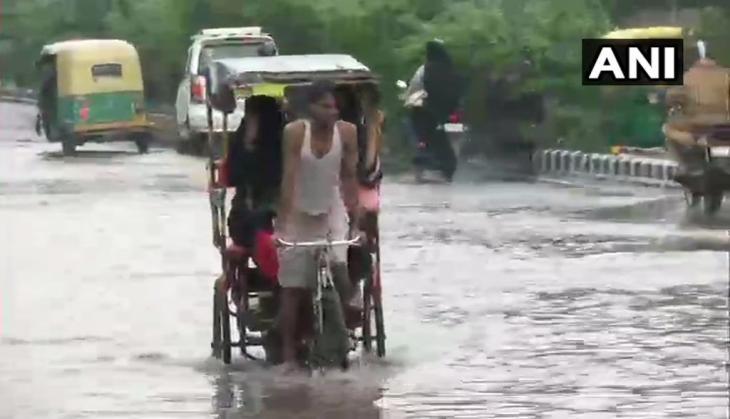


Heavy rains and thunderstorms hit Delhi and NCR, causing severe waterlogging and disruption in daily life. Many popular areas like Connaught Place and Noida Sector 62 were inundated, leaving people stranded and affecting vehicular movement. This has led to protests by the opposition BJP and forecasted continues rain and cloudy skies for the next seven days by the IMD.
Heavy Rains and Thunderstorms Batter Delhi and NCR: A Saga of Inundation and Disruption
The bustling metropolis of Delhi and its surrounding National Capital Region (NCR) have been relentlessly pounded by torrential rainfall and violent thunderstorms over the past few days, leading to widespread waterlogging and chaos.
Background
Delhi, India's capital city, is known for its extreme and unpredictable weather during the monsoon season, which typically lasts from July to September. Heavy rainfall is a common occurrence during this period, but the recent downpours have surpassed expected levels.
Current Situation
Beginning on August 31, 2023, an immense deluge of rain descended upon Delhi and NCR, causing rivers to overflow, roads to turn into lakes, and buildings to be submerged. Iconic landmarks such as Connaught Place, the commercial heart of Delhi, and Noida Sector 62, a major IT hub, were deeply inundated, leaving thousands stranded and vehicular movement paralyzed.
The relentless downpour has led to massive disruptions in daily life. Schools, colleges, and offices were closed, while public transportation services were severely affected. Power cuts and water shortages further compounded the misery for residents.
Political Protests and Weather Forecasts
The heavy rains have sparked protests from the opposition Bharatiya Janata Party (BJP), which has accused the ruling Aam Aadmi Party (AAP) government of inadequate preparations. The IMD (Indian Meteorological Department) has forecasted continued rain and cloudy skies over the next seven days, raising concerns about the possibility of further flooding.
Top 5 FAQs and Answers
1. What is the cause of the heavy rains and thunderstorms? A: The rains are part of the annual monsoon season, when moisture-laden winds from the Bay of Bengal bring heavy precipitation to India.
2. What areas have been most affected by the flooding? A: Connaught Place, Noida Sector 62, Patel Nagar, Rohini, Dwarka, and Pitampura are among the worst-hit areas.
3. What are the measures being taken by authorities? A: The authorities are deploying pumps to remove water from flooded areas, providing food and shelter to the affected, and repairing damaged infrastructure.
4. How long is the rain expected to continue? A: The IMD has forecasted continued rainfall for the next seven days, with heavy showers likely.
5. What precautions should people take during the rains? A: Residents should avoid venturing outdoors during heavy rain, stay informed about weather updates, and keep essential supplies on hand.

On the auspicious occasion of Bhai Dooj, Prime Minister Narendra Modi, Union Home Minister Amit Shah, and Union Health Minister JP Nadda extended their heartfelt wishes to the nation, celebrating the sacred bond between brothers and sisters. This festival, also known as Bhaiya Dooj, Bhai Tika, or Bhau Beej, is widely celebrated across India with love and festivity, symbolizing the unbreakable affection and dedication between siblings. The day holds great significance in Hindu mythology and is associated with the liberation of all living beings from suffering and the bestowal of happiness.

On Wednesday, April 30, Hindus will celebrate the auspicious festival of Akshay Tritiya, also known as Akha Teej. This day is believed to bring luck and success, and is considered free from all malefic effects. People often buy gold on this day as it is believed to bring prosperity and wealth in the future. Akshay Tritiya is also considered to be ruled by Lord Vishnu, who is a revered deity in Hinduism. The best time to buy gold on this day is between 06:11 AM and 02:12 PM, according to Drik Panchang.

As Diwali comes to a close, the festival of Bhai Dooj celebrates the unconditional love and bond between brothers and sisters with various names across India. This year, Bhai Dooj falls on October 23, with the tilak ceremony auspicious time from 1:14 PM to 3:29 PM. It is a time to cherish the cherished memories and create stronger relationships between siblings. Share heartfelt wishes and blessings on this day to celebrate the beautiful bond of love and togetherness.

Marking a historic moment, President Droupadi Murmu offered prayers at the Sabarimala Temple in Kerala, becoming the first serving state head to do so. She climbed the 18 sacred steps to reach the shrine and offered darshan to Lord Ayyappa, carrying the sacred bundle on her head. This visit holds symbolic significance as the president represents both Vaishnavism and Shaivism, making it a moment of unity in Hinduism.

As Diwali celebrations come to an end, the day after is marked by the auspicious festival of Govardhan Puja or Annakut. In 2025, this festival falls on Wednesday, 22 October, and is a reminder to express gratitude towards nature and the environment. Devotees prepare special offerings and decorate their homes with flowers and diyas, honoring Lord Krishna and the bounty of nature. While the article provides general guidance, it also urges readers to consult experts before implementing any beliefs or practices discussed.

The Udupi Catholic diocese has extended warm Diwali greetings, citing the festival as a symbol of moving from darkness to light, falsehood to truth, and death to new life. The diocese emphasizes India's diversity and unity in celebrating different festivals together. Sharing a symbolic story, the diocese urges people to be the candle of hope that relights peace, faith, and love in the world. The message concludes with a call to action to be the light that builds bridges of love, faith, and compassion.

The Hindu Vikram Samvat calendar marks October 22, 2025, as Gujarati New Year, a day of renewal, positivity, and joy for devotees. From early morning prayers to temple visits, sweets, and sharing warm messages, the day is a festive symbol of hope and abundance. As it falls a day after Diwali, it's also a time to open new accounts, perform rituals like Chopda Puja, and spread love, gratitude, and togetherness with family and friends.

As Diwali celebrations come to an end, Mumbai is facing a major problem of poor air quality. The city is engulfed in a thick layer of smog, with visibility reduced to minimal in some areas. The situation has been worsened by unseasonal rain, with no significant improvement in air quality. It is not just Mumbai, but several other cities in India are also dealing with pollution levels breaching the "very poor" and "severe" categories. With AQI readings hitting 380 in some areas, measures need to be taken to combat this worsening air quality situation.

Kiran Mazumdar-Shaw, founder of Indian biotech giant Biocon, met with top government officials in Karnataka, including Chief Minister Siddaramaiah, to discuss the city's deteriorating infrastructure. This follows a recent social media post where Shaw called out the government for their ineffective management and lack of accountability. With heavy rains expected in the coming days, these concerns take on even more urgency as residents brace for potential waterlogging and traffic congestion.

Hospitals in the city have reported an increase in burn cases linked to the celebration of Diwali, with over a hundred cases reported at AIIMS Delhi alone. Despite the worsening air pollution, no major increase in respiratory distress cases was seen, but senior doctors anticipate an increase in the coming days. Several patients who suffered burns during the festival recounted how even seemingly harmless firecrackers resulted in severe injuries. While most cases were minor, a total of 129 patients were treated for firecracker-related injuries at Safdarjung Hospital.